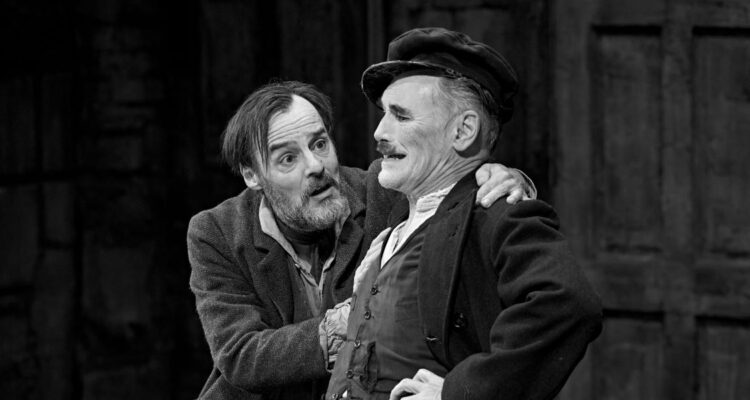This year marks the centenary of the first London production of the second part of Sean O’Casey’s Dublin Trilogy – ‘Juno and the Paycock.’ For all its fame, this play is not produced in London that often, and so there was some considerable anticipation around the opening, not least on account of the notable names in the cast. But while there are many powerful moments to be witnessed, the whole evening is less than the sum of its parts.
Let’s take the positives first of all. This play, set in the era of the Irish Civil War, is on an epic scale and combines several genres of theatre in one – comedy, tragedy and melodrama. The set design by Rob Howell certainly rises to this challenge: expressionistic and spacious, it captures the grim grandeur of tenement life in decayed Georgian Dublin with rooms underfurnished through poverty, and only gaudily improved by a temporary upturn in the Boyle family fortunes. Things open up memorably and melodramatically in the final act, and a tiny crucifix hovers above suggesting the omnipresence of the church and the miniscule prospect of consolation, let-alone salvation. These virtues are admirably enhanced by the atmospheric lighting design from Hugh Vanstone and evocative soundscapes created by Simon Baker.
On the face of it such a talented cast as is assembled here should sweep all before them; but the production never quite takes off as it should, partly because of the absence of strong direction, and partly, it has to be said, because of structural problems in the play itself. The first half works wonderfully well on its own terms, alternating between comic bravura from Mark Rylance and Paul Hilton as ‘Captain’ Jack Boyle and his sidekick Joxer, and stern gritty stoicism presided over by J.Smith-Cameron, as she tries to work out where the next meal is coming from. There is a feast of physical acting to enjoy, with one scene in particular that stands out – in a fit of pique at his wife’s reproofs, Boyle disdains initially to eat the breakfast his wife has left for him. Yet for ten minutes of hilarious stage business Rylance pirouettes around the sausages, building audience expectations until he succumbs to temptation just as his wife returns, when he stuffs the hot pan down his trousers. It brings the house down, in a manner worthy of Charlie Chaplin, whom Rylance is here made up to resemble.
This is glorious stuff, but there is simply too much of it, and as the mood darkens in the second half, and the shades of Civil War and single motherhood suggest imminent family dissolution something of a disconnect emerges between the mood of the text and the tone of and pace of some of the acting which diminishes the emotional impact of the whole. It is not helped by O’Casey’s decision to introduce a range of new characters, entertaining and vividly drawn as they may be, whose interventions hold up the action even further. It is a long evening, and at too many points it felt long too.
That said, it would be churlish not to acknowledge the quality of some of the characterisations elsewhere. As Juno, Smith-Cameron moves into a new register of transcendant grief in the final scenes that does much to recover lost ground elsewhere, as do Eimhin Fitzgerald Doherty and Aisling Kearns, as son and daughter, Johnny and Mary Boyle. There are also fine cameos from Anna Healy as a garrulous and epically drinking neighbour, Ingrid Craigie, playing an embittered and grieving widow, and Chris Walley as the smooth-talking middle-class teacher who turns out to be far less than he seems.
On the whole though, the pace is too sluggish and there is too much business off the speech, which may be locally delightful, but ultimately strategically unwise. In a play as sprawling and multi-layered as this a firmer directorial hand is needed to keep it on track with sufficient momentum. Classic status and classy actors are not enough in themselves.
Sean O’Casey
Director: Matthew Warchus
Cast: Ingrid Craigie, Eimhin Fitzgerald Doherty, Sean Duggan, Leo Hanna, Anna Healy, Paul Hilton, Aisling Kearns, Mark Rylance, J. Smith-Cameron, Chris Walley
Until 23 November 2024
2 hours 40 mins, with interval
Photo Credit: Manuel Harlan

